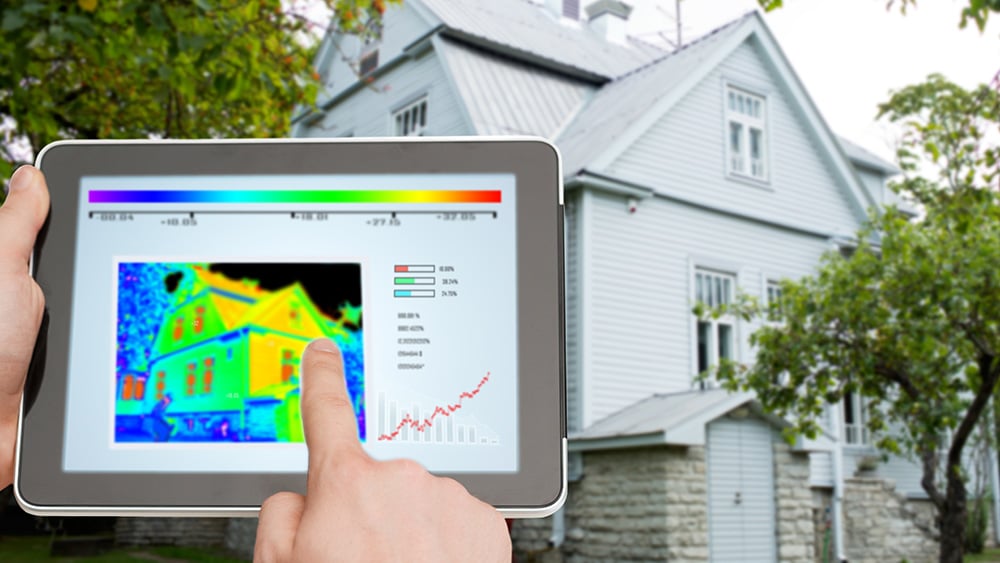
Every year, it’s the same question: “Why are my energy bills so high, and how can I lower them?” You’ve tried cutting back your usage, but it doesn’t seem to help much. Perhaps you need to fix the problem at its source with a home energy analysis. Here are five home improvement projects you can make to save energy and money throughout your house.
Seal Air Leaks
Air leaks are one of the biggest causes of energy loss in homes. You’re trying to heat or cool your home, but the treated air leaks out around doors and windows, and even through cracks in the walls. Meanwhile, air from outside leaks in to take its place. Because of this, your HVAC system works longer and harder to get your home to the proper temperature, wasting energy and wearing out your system.
The first thing you need to do to fix this is to schedule a home energy usage audit from an HVAC professional. They can test your home to find out exactly where these leaks are so you can seal them for whole-house energy improvements.
It’s also important to seal your home’s ductwork. If there are leaks in the ducts, less air from the HVAC system will be able to circulate through your house. Inspect ducts thoroughly and locate any holes, tears or places where two sections of ductwork have come apart. Seal these leaks with metal tape or mastic sealant.
Install Insulation
One of your most important energy-savings projects is insulation. Insulation slows the flow of heat through your home. Heat rises, so in the winter, attic insulation creates a barrier, keeping the heat from your furnace inside your home longer and allowing it to reach its ideal temperature more quickly. During the warm spring and summer months, insulation in the walls can stop the outside heat from getting in so that you don’t have to rely as much on your A/C.
Upgrade to a Programmable Thermostat
A programmable thermostat allows you to switch back and forth automatically between your regular comfort setting and a more energy-efficient one when the home or different zones are empty. For example, when everyone’s home in the morning, your HVAC system heats and cools your house to make it comfortable for your family. But when you go to work, the kids go to school, and no one’s around most of the day, a programmable thermostat can switch to a less comfortable, more energy-efficient temperature so your system isn’t running all day, conditioning an empty house.
There are different thermostats to fit various schedules.
- A 5+2 model has one schedule for weekdays and a separate one for weekends.
- A 5-1-1 model is similar, but it allows you to program Saturday and Sunday individually.
- A 7-day thermostat allows you to program each day separately, which works best for those with flexible schedules.
Reset the Water Heater Thermostat
The default setting of most water heaters is higher than you need. If it’s still on the factory setting of 140 degrees, you can reduce it to 120 degrees without making a noticeable difference. Lowering the temperature even just a few degrees can create more efficient water heating and reduce water heating costs in your home.
Upgrade Appliances
No matter what home energy upgrades you make, they won’t do much good if your appliances are wasting power. Therefore, you might need to invest in newer, more efficient appliances when the time comes for replacement. Fortunately, the federal Energy Star program can help with that. They find the most energy-efficient appliances, including HVAC systems, refrigerators, dishwashers and more, and identify them by putting the blue Energy Star logo on them.
When you see the blue Energy Star logo, it means that the appliance has been proven to save both money and energy over similar models while retaining all the same features and without sacrificing performance. And if the Energy Star model is more expensive, you’ll make that money back in energy savings within a reasonable amount of time. It might seem like a big expense at first, but investing in a new, energy-efficient furnace, refrigerator or another appliance can save you a lot of money in the long run.
If your home needs an individual energy evaluation, contact Warner Service to have a certified technician perform an energy audit and help you get on the right track to home energy optimization. If you're looking for more home weatherization tips, consider subscribing to our industry articles using the button below.


